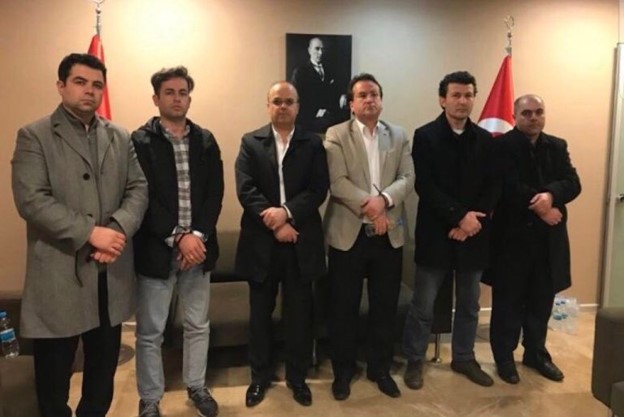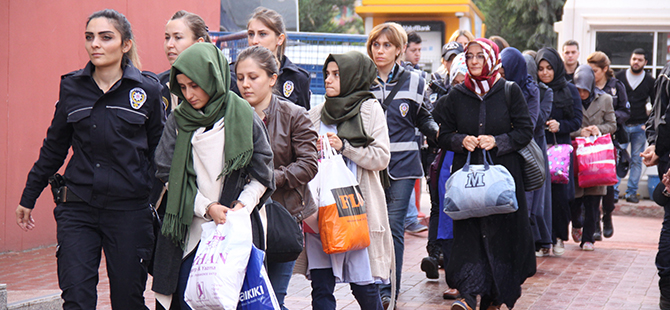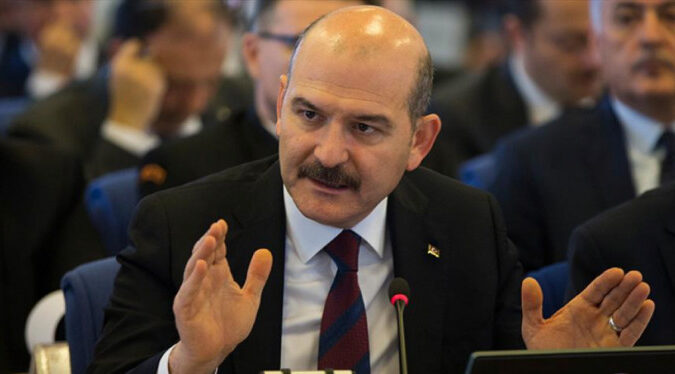Nordic Monitor
Turkish Interior Minister Süleyman Soylu thanked Algerian President Abdelmadjid Tebboune for the deportation of Turkish businessman N.N.K., who has alleged ties to the Gülen/Hizmet movement and was living in Algeria, and revealed that the businessman was brought back to Turkey by the Turkish intelligence agency (MIT).
Soylu appeared before parliament’s Planning and Budget Committee on November 26, 2020 to present the case for the ministry’s increased budget for 2021. According to the minutes (page 316) of the meeting, he also briefed lawmakers on a MIT operation last week to fly N.N.K. to Turkey from Algeria.
“… We brought [N.N.K.] back. God bless Recep Tayyip Erdoğan and the Algerian president. We requested this [from Algeria]. There were two persons but one had previously escaped [from Algeria]. [N.N..K] was among the representatives [of the movement]. We got him and brought back –- MIT,” said Soylu.
According to the interior minister, the deportation of the Turkish businessman was discussed by President Erdoğan and Algerian President Tebboune. He also said Turkish intelligence agency MIT was involved in the operation.
By sending a businessman to jail in Turkey, Algeria has reciprocated Turkey’s move over the summer to extradite Algerian military fugitive Guermit Bounouira, The Arab Weekly claimed. Bounouira was handed over to Algerian security officials in Turkey on July 30 after being accused of divulging military secrets.
Algerian President Tebboune phoned his Turkish counterpart in July to secure the return of Bounouira, who fled Algeria days after its army chief Ahmed Gaed Salah died in December 2019, Reuters reported.

According to recent official reports Turkey has sent 800 extradition requests to 105 countries in the last four years. Over 110 alleged members of the Hizmet/Gülen movement have been abducted abroad by Turkish intelligence and brought back to Turkey as part of the Turkish government’s global manhunt. They were reportedly subjected to torture and ill-treatment and were denied the right to a fair trial.
On the night of August 28, 2019 some 30 police officers broke into the residence of Arif Komiş, a chemistry teacher who worked at a Turkish school in Malaysia affiliated with the movement. They arrested Komiş, his wife and their four children. Four police officers told the Komiş family their passports had been canceled by the government of Turkey and that they should prepare in five minutes for imminent deportation to Turkey.
Komiş held a valid asylum-seeker certificate from the Office of the United Nations High Commissioner for Refugees (UNHCR) indicating that he should be protected from forcible return to a country where he claimed to face threats to his life or freedom, pending a final decision on his refugee status. Yet, he was forcibly and illegally removed to Turkey on a special plane.
The United Nations Working Group on Arbitrary Detention (WGAD) found the arrest and detention of the Komiş family arbitrary and recommended that the Turkish and Malaysian governments: (1) release Arif Komiş, who is currently in pre-trial detention; (2) pay compensation or other reparations to the Komiş family; (3) conduct investigations into the violation of the Komiş family’s rights; and (4) make the necessary legislative amendments and/or changes in practice to harmonize the laws and practices with their international obligations in line with the opinion.
In a similar case WGAD concluded that the arrest, detention and forced transfer to Turkey of six Turkish teachers by Kosovar and Turkish state agents in Kosovo on March 29, 2018 was arbitrary and in violation of international human rights norms and standards.

In September 2018 seven Turkish teachers working for a group of schools affiliated with a faith based group, the Gülen/Hizmet movement, in Moldova were illegally detained and deported by Turkish and Moldovan intelligence authorities. The teachers then were transported to Turkey by Turkish intelligence officers and put behind bars.
Following the intelligence operation, five of the seven Turkish teachers appealed to the European Court of Human Rights (ECtHR), which fined Moldova in June 2019 for the abduction of the Turkish teachers at Turkey’s request. The court ordered the government in Chisinau to pay 25,000 euros each to five of the Turkish citizens who took their cases to the ECtHR for violating articles 5.1 and 8 of the European Convention on Human Rights. “Depriving the applicants of their liberty in this way amounted to an extra-legal transfer of persons from the Moldovan territory to Turkey which circumvented all guarantees offered to them by domestic and international law,” it said.

The Turkish government also signed bilateral security cooperation agreements with multiple states that were phrased ambiguously to allow for the expulsion or abduction of Turkish nationals living abroad, according to a joint UN letter released by Nordic Monitor.
In May UN rapporteurs Luciano Hazan, chair-rapporteur of the Working Group on Enforced or Involuntary Disappearances; Felipe González Morales, special rapporteur on the Human Rights of Migrants; Fionnuala Ní Aoláin, special rapporteur on the Promotion and Protection of Human Rights and Fundamental Freedoms While Countering Terrorism; and Nils Melzer, special rapporteur on Torture and Other Cruel, Inhuman or Degrading Treatment or Punishment sent a joint letter to the Turkish government to express their concern about the “systematic practice of state-sponsored extraterritorial abductions and forcible return of Turkish nationals from multiple States to Turkey.”
The UN rapporteurs asked the Turkish government to provide further information about its operations in coordination with authorities in Afghanistan, Albania, Azerbaijan, Afghanistan, Cambodia, Gabon, Kosovo, Kazakhstan, Lebanon and Pakistan for the abduction, arbitrary arrest, detention, enforced disappearance or torture of at least 100 individuals suspected of involvement with the Gülen movement.
According to the UN document “[S]tate-sponsored extraterritorial abductions and forcible return of Turkish nationals from third countries may result in serious violations of the individuals’ rights to liberty, personal security, integrity and fair trial in contravention of the Universal Declaration of Human Rights (Articles 3, 5, 9 and 14), the International Covenant on Civil and Political Rights (ICCPR, Articles 7, 9, 13, 14, 18, 19 and 22) and the Convention against torture and other cruel, inhuman or degrading treatment or punishment (CAT, in particular Article 3), as well as the Declaration on the Protection of All Persons against Enforced Disappearance (Articles 2, 3, 6, 7, 13, 14 and 20).”
The UN rapporteurs also referred to “Article 7 of the Declaration [on enforced disappearance] stipulating that no circumstances whatsoever, whether a threat of war, a state of war, internal political instability or any other public emergency, may be invoked to justify enforced disappearances.”

The crackdown on Erdoğan critics throughout the country intensified in the aftermath of the corruption scandal of December 2013 that incriminated Erdoğan, his family members and his business and political associates. Immediately after the corruption investigation, Erdoğan accused the police officers, judges and prosecutors involved in the case of mounting a coup against his government and claimed they were linked to the Gülen movement, which he branded a “parallel state.”
The crackdown on critics and the purge of government officials that were initiated in the aftermath of the December 2013 corruption probes accelerated after a failed coup in July 2016, giving Erdoğan a pretext to pursue a mass purge with no administrative or judicial probes. The government has rounded up over half a million people from the Gülen movement since 2016, mainly on coup, terrorism or defamation charges. The witch-hunt aims to suppress civil society, silence critical voices and stifle the right to dissent, while Erdoğan continues to transform Turkish democracy into a dictatorship.
In May 2016 the Turkish government designated the movement, led by US-based Turkish Muslim scholar Fethullah Gülen, as a terrorist entity without any evidence that Gülen or people affiliated with the movement committed any terrorist acts. Then, a coup was attempted in July 2016, reportedly at Erdoğan’s direction, as a pretext for an ensuing crackdown. Following the failed coup, which was called “a gift from God” by Erdoğan, thousands of Turkish citizens were forced to flee their homes due to his anti-democratic rule and a still-ongoing purge of government critics.
Erdoğan then moved Turkey away from the core values of the EU by using the coup to restrict democratic rights and erode the rule of law. In the aftermath of the abortive putsch , the Turkish government violated international law by arresting tens of thousands, including journalists, human rights defenders, academics, Kurdish MPs, foreign reporters, civil servants and businessmen; purging more than 130,000 civil servants and 20,571 members of the military from their jobs without any effective judicial or administrative investigation; investigating more than a half million people on dubious terrorism allegations; and shutting down media outlets and seizing their assets. Torture allegations have often been voiced by human rights defenders since the failed coup.












